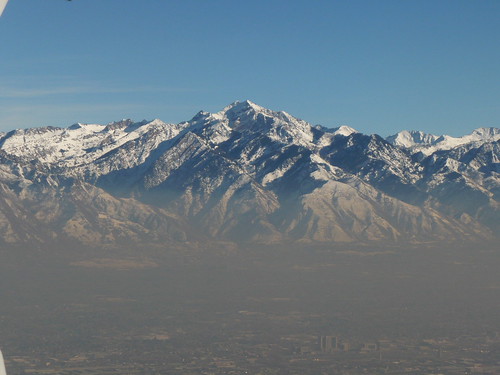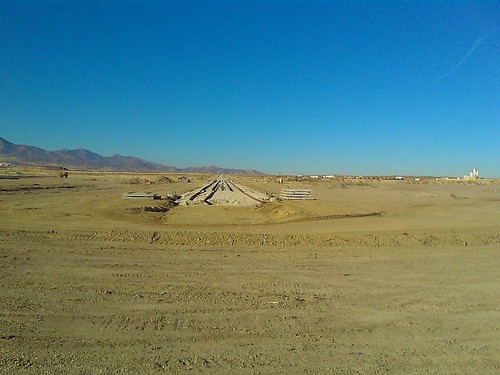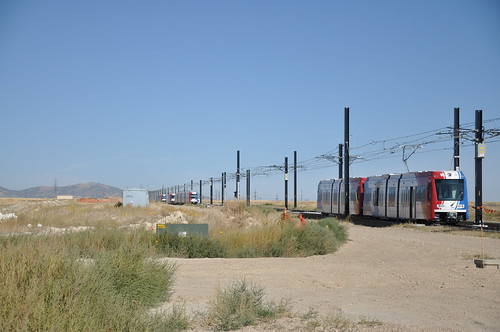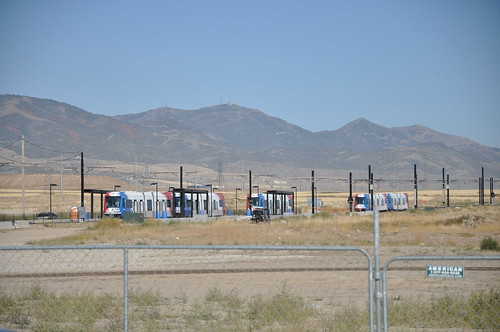In Europe now, it's being taken even further. Eco suburbs in places like Freiburg are popping up and development is happening as tram lines are planned. The map below from a paper written by Berkeley student Andrea Broaddus shows the expansion of the network.
 As an interesting side note, Broaddus' study noted that two ecosuburbs were the same except for parking provisions:
As an interesting side note, Broaddus' study noted that two ecosuburbs were the same except for parking provisions:Travel behavior data showed that residents of Rieselfeld had higher rates of transit use in an otherwise typical modal split, while Vauban’s residents had extremely low car share and high bicycle share. These differences were attributed in part to more Vauban’s more restrictive parking policies.But back to the Reiselfeld. Of interest here is how the development was conceived. The tramway was built before the development and historical Google Earth images show this development happening.
Reiselfeld in 2000

Similar image from a different angle, from The Modern Tram in Europe.
 And a more recent image in 2006
And a more recent image in 2006
To me this is awesome. This is true transit oriented and development oriented transit. Could we ever do something similar here in the United States? It's already happening. Though perhaps not as eco-friendly or dense as would be most sustainable.

Salt Lake City is building the Mid Jordan Trax line into the Daybreak Neighborhood drawn up by Calthorpe. While all the houses are planned to be a five minute walk from local shopping and destinations, there are still a lot of single family homes. Additionally, there is a freeway that is being constructed up the left edge of the valley that will just make Utah's air pollution and inversion days that much worse in the future.
Image courtesy of Calthorpe Associates:

Salt Lake City Suffers from Wicked Inversion Days

Flickr Photo via UTA

Daybreak Under Construction - Flickr Photo via Jason S

Daybreak Completed - Flickr Photo via Brett Neilson

All the negatives aside, I think its an interesting experiment and one worth watching. And watch from the air we will...
2003

2005
 2006
2006 2009
2009
More Flickr photos at Daybreak from UTA


And finally a little easter egg for LRT Vehicle nuts.

4 comments:
Excellent post. But I must point out that Europeans can do this kind of planned new-suburb development around quality bus services as well. See this piece of mine on Almere, Netherlands:
http://www.humantransit.org/2010/10/aimere-netherlands-as-bus-oriented-development.html
What's interesting about Almere is that the service gets much closer to each home than rail does in Daybreak. Almere offers far more extensive frequent services precisely because it relies on a lower-capacity lower-cost service model. That's a problem for the rail advocate, but an advantage if you just want to get where you're going.
But of course, Jarrett, bus works a lot better in a European environment where it doesn't compete against cheap driving. In the USA, **ONLY** rail has shown any ability to get people out of their cars in significant numbers.
Developments like Almere can get closer to each resident because the Dutch historically and still naturally build very densely, even in rural areas. The typical Dutch housing plan is a packed cluster of houses within minutes walking distance of a real center, surrounded by farms. Unless you live on a farm, you live very close to all your small town neighbors. Thus bus routes to small towns can very easily reach the vast majority of homes.
This is the opposite of te American development default, where everyone has to have as much space between them and their neighbor-and any kind of commercial development- as possible.
Looks like Daybreak will be getting LRT by the time I've written this! :) But then again, the Mountain View freeway deserves a big BOO!!!
Post a Comment